Bed bugs have adapted and evolved for many thousands of years to spot a human host they can feed on. They use this ‘experience’ to find their way to you either hitching a ride home with you from work or the bus, or by making their way from the neighbor’s house to yours.
Bed bugs are attracted by warm temperature, CO2 emitted by breathing, and untidiness. Clutter gives them a better chance of finding safe harborages, and places they can lay their eggs.
There are also many other things that attract them—including some surprising explanations backed by research. There are also common myths about bed bugs that you’ve probably heard but are untrue.
Where do Bed Bugs Come From?
If you’ve recently had an infestation of bed bugs, the odds are that they got into your house one of two ways. First, they may have hidden inside your clothing or bags. You can pick them up almost anywhere. It could be from work, from the gym, from public transport, from a friend or relative’s house. It could be anywhere where there are people.
This is how they’ve found new hosts for thousands of years. Even in prehistoric times, when big families and groups used to live in caves, bed bugs would go from host to host because of social contact and proximity. In the same way, if you live in an apartment, there’s another option.
Your infestation may have come from a neighbor, either above, below, or next door. Bed bugs can crawl through small cracks in the wall, floor or ceiling. They can even scuttle across hallways if they’re feeling particularly adventurous.
So long as they can rest in a place during the day, but still access a host at night, they’re happy to live anywhere. And in the absence of a host, they can survive for up to a year, continually exploring in search of somebody new.
This is why bed bugs are such a big problem in apartment complexes. Even if you completely bomb your apartment with pesticides and other bed bug treatment methods, they can quickly come back again from another infestation next door. Once bed bugs are in the walls or crawl spaces, it’s just a short step for them to find their way to your apartment.
It’s all down to the fact that bed bugs are natural explorers. Like any insect, when they explore, they wander around—to us, it looks aimless—but once they pick up a signal of food, be it a smell or another sign that something’s nearby, they gradually make their way to it. This could well be how you got your initial infestation. So, what are these signs and signals?
What Attracts Bed Bugs into Your Home?
How are bed bugs so good at finding new human hosts? It’s no coincidence. They’ve developed alongside us for thousands of years to be able to find us easily, and adapt to their—our—habitat. Their ‘wings’ are an excellent example.
Bed bugs can’t fly, but they have what are called vestigial wings. In plain English, they have small stumps where their wings used to be. They didn’t need them, and they got in the way when they tried to fit into the small gaps in furniture and your mattress, so they eventually lost them.
Similarly, bed bugs have evolved to be able to find you easily. They detect many markers that show them a host is a) nearby, and b) sleeping, so that they’ll get a chance to feed. Soon, we’ll take a look at what they are. But first, it’s important to understand where they come from.
1) CO2 (Breathing)
The first and perhaps the most important signal for a bed bug is breathing. The air we breathe contains 20.95% oxygen, and 0.04% carbon dioxide (CO2). However, this all changes when we breathe out. Our body needs oxygen, but it doesn’t need CO2. Not only that, but we get rid of spare carbon dioxide that we may have eaten or otherwise create.
It’s a natural by-product of cellular respiration. Cells use oxygen to function and produce CO2 as a by-product of what they do. And we have to get rid of it somehow, or adverse health effects can result. All of this is to say that the air that we breathe out contains between 4 and 5% carbon dioxide.
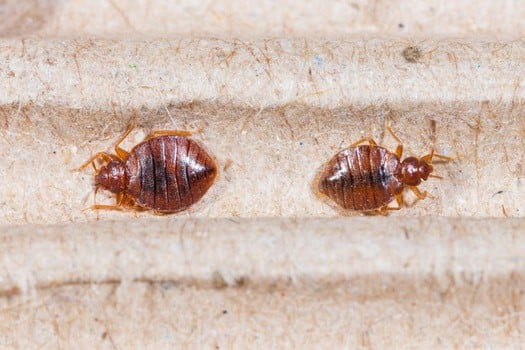
Bed bugs have developed to be able to detect this additional CO2 in the air around us. This isn’t unique to bed bugs; most parasitic insects are attracted to CO2 because it’s so useful for identifying a living host (since what else produces such relatively large amounts of carbon dioxide?)
A paper in the academic journal Molecules and Cells pointed out that they may have developed this skill because the places where insects live often become saturated with CO2. Termite nests are an excellent example: the level of CO2 can reach 15% since the air is trapped and recirculated. Bedbugs retain this skill and use it to find their way to you at night.
2) Are Bed Bugs Attracted to Heat?
Next, the warm temperature can lead bed bugs to you. The temperature of a sleeping body is an excellent marker: throughout the many tens of thousands of years we have coexisted with bed bugs and other parasites, the only heat sources late at night have been us, and recently, fire and central heating. It has therefore always been a certainty to a bed bug that warmth equals a host.
Even today, when our homes are kept equally warm in the summer and winter, your body temperature can give you away. You’re far warmer than your surroundings, whether you wear pajamas to bed or not. Body temperature gradually decreases before you go to bed. But it increases through the night as you warm up, especially if you have a thick comforter. This can even attract bed bugs from next door.
And did you know that this means you can catch bed bugs on public transport? It’s true. According to news reports, the recent heatwave wasn’t just good for business; it was good for bed bugs too. They thrived on public transportation, hiding in upholstered seats either to feed or to find their way home with somebody. The warm temperature of your body draws them out of hiding. How to avoid them? Don’t sit down, and don’t put your bag on chairs.
Bed bugs will crawl across hallways and through the walls to access other apartments. A group of scientists wrote a paper for PLOS One to determine how often bed bugs move between apartments, and what they found was bad news.
They stated that a) bed bugs will travel distances of 50 feet or more to find a new host if they’re hungry, and that b) this meant that bed bugs regularly travel between apartments. They estimated that 5% would ‘move house’ over the course of 15 days, in a severe infestation. They put this down to body heat and CO2, equally.
So, what can you do about your body heat? Not much. You’re faced with a double-edged sword. You can choose not to wear pajamas to bed so that you’re slightly cooler; this won’t reduce the number of bites, and if anything, will make it easier for bed bugs to feed. Or, you could wear even thicker pajamas: this would make it more difficult for them to feed but would increase your temperature.
Alternatively, you can use a heat trap to confuse at least some bed bugs in the infestation. These traps give off heat at the same temperature as you do, but instead of offering them the opportunity to feed, the lure traps them inside or kills them.
3) Untidiness (Especially Clothes & Bedding)
Over the last hundred years, we gradually managed to get rid of bed bugs in the developed world. We achieved this using a mix of pesticides like DDT and, generally, better housekeeping practices. This included vacuum cleaning and changing bedding more often. Overall, this meant that bed bugs were almost eradicated (if only they had been!)
Unfortunately, there was a ‘side effect’ of sorts as a result of this drive to get rid of these insects. It was that people began to associate bed bugs with poor personal hygiene. This, in itself, is a myth.
Bed bugs are no more attracted to a person who hasn’t bathed than a person who has. However, there is a small grain of truth to the idea. Better housekeeping can prevent bed bug infestations from taking hold and does prevent them from getting worse. Examples include:
- Vacuum cleaning. You can suck up bed bugs using a vacuum cleaner. This can’t eradicate an infestation, but it does keep the population under control.
- Changing bedding. Bed bugs like to live, and lay their eggs, undisturbed. By changing, washing, and airing out your bedding, you kill bed bugs and kill their eggs.
- Tidying up from the floor. Bed bugs don’t know what clothes are. If they see them on the floor, all they see is a nice place to spend the night. If you leave your clothes and belongings on the floor for long enough, they even lay their eggs there.
So, by keeping up with the housework, you can kill a large percentage of the bed bugs in your home. This stops infestations from getting worse and makes them easier to kill in the long run.
4) Are Bed Bugs Attracted to Scent?
Are bed bugs attracted to dirty laundry? They sure are, and it’s all because of how you smell.
So, once you’ve started tidying up, you might think that you’ve finally started to get the problem under control. And you’re right. But a recent study by British scientists found that bed bugs are attracted to dirty laundry, even if you’re not wearing it. The team at the University of Sheffield conducted two separate experiments to test their hypothesis.
First, they had a group of people wear clothes for just three hours to get their scent on it. They then put these clothes in a tote bag. They also filled another tote bag in a separate experiment with clean clothes, to act as a control for their experiment. If the bugs were to be attracted to both the bags equally, then it would prove that a little sweat and scent wouldn’t have any effect.
But they were right, to begin with. They found that bed bugs were twice as likely to congregate on bags with clothes that had been worn inside them. At the same time, they also increased the carbon dioxide in the room to see if that would have any effect. It made the bed bugs congregate on dirty clothes even more. This suggests that it was connected to host-seeking behavior.
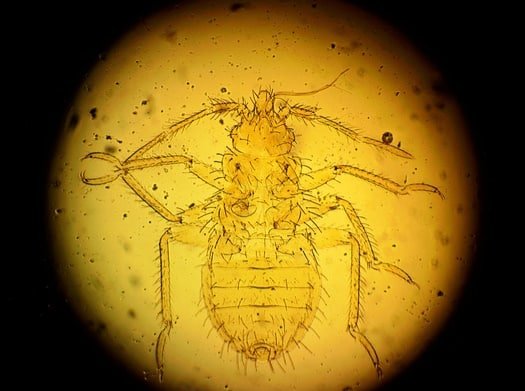
In practice, this means that you shouldn’t leave clothing or any dirty bedding on the floor near your bed. It will act as a congregation-spot for bed bugs. Not only that, but there’s a chance that they could seek out your laundry in the hamper and use that as a launching point too. From there, they could easily infest other rooms.
5) Are Bed Bugs Attracted to Urine?
There isn’t any clinical evidence that proves bed bugs are attracted to urine. However, there are reasons why they may be.
First of all, bed bugs aren’t attracted to things that are messy or dirty, just because they are messy and dirty. Bed bugs aren’t attracted to dirty dishes, for example, but are attracted to dirty laundry because it smells like their host.
So, just because a soiled mattress is dirty in the traditional sense, that doesn’t mean that bed bugs will be attracted to it “just because.” This is backed up by the fact that there are no scientific studies that have yet studied the topic. We, therefore, can’t definitively say either way whether it’s true or not. However, there is supplementary evidence that may prove that it can.
Urine that seeps into a mattress, of course, can’t get out. If you or somebody you know has incontinence, you know that you need mattress protectors for exactly that reason. The urine then evaporates/dries, but certainly leaves some chemical trace behind, which is why the mattress is then soiled and doesn’t smell in perfect condition.
A study from a whole hundred years ago looked into the carbon dioxide content of urine. They found that urine can contain significant amounts of carbon dioxide, dependent on the pH of the urine in question. The more acidic the urine, the less carbon dioxide it contained.
The more neutral or base the urine, the more carbon dioxide it contained. At a pH of 7.0, one of their subjects’ urine was 1/3 carbon dioxide. The pH was controlled almost exclusively by diet, with a vegetarian diet providing the most base urine, and a diet high in meat, cheese, and eggs producing the most acidic urine and therefore the least carbon dioxide.
Now, this is far from definitive proof either way whether urine can or cannot attract bed bugs. However, both the immediate evaporation of carbon dioxide and the long-term presence of it within the mattress could conceivably attract them to a host.
6) Are Bed Bugs Attracted to Blood Types?
Here’s another one you might have heard before. Unfortunately, precious little research has been done on whether bed bugs are attracted to different blood types. However, there’s strong evidence to suggest that they might be. There are also a ton of anecdotal stories that seem to indicate a link between blood type and bed bugs.
The idea comes from real scientific research, not into bed bugs, but on mosquitos. Mosquitos feed on blood just like bed bugs and are attracted by the same things—temperature and carbon dioxide. They even have similar proboscises (feeding tubes that they use to suck blood).
Their preference for different blood types has been established through many studies. Scientists have found that people with Type O blood are a mosquito’s favorite and that they feed on these people twice as often as they do on people with Type A blood.
According to the Smithsonian, mosquitos can tell because 85% of people secrete a chemical through their skin that indicates what blood type they have.
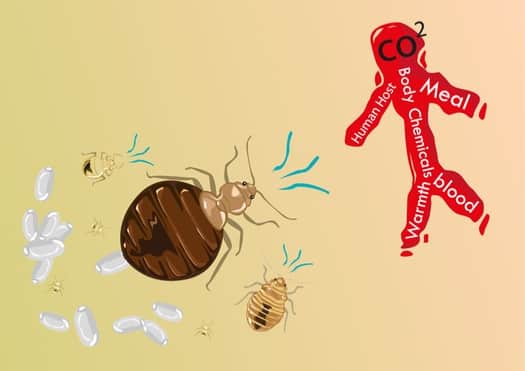
While no studies have been done specifically on bed bugs, it wouldn’t be surprising if they’re the same. They use the same methods to find hosts and feed using the same apparatus. Not only that, but there are plenty of people who are bite-free despite living with other people that get bitten mercilessly. So it very well may be the case that blood type has something to do with it.
Not only that, but the ‘ingredients’ in your blood can also make a difference, A recent study found that bed bugs avoid blood that has a higher alcohol content than usual.
Researchers at Nebraska-Lincoln University found that people who had been drinking received fewer bites, even if they were equally infested to the control group. So, the actual content of blood does matter to a bed bug. It’s incredible that they’re able to figure out so much despite being such simple creatures.
7) Are Bed Bugs Attracted to Color?
This might not have been something that would occur to you, but bed bugs have favorite colors. According to the Journal of Medical Entomology (entomology is the study of insects), bed bugs are attracted to red and black but try to avoid yellow, green and bright white. A study done by researchers from the University of Florida tested the idea by studying bed bugs in the lab.
The scientists put groups of bed bugs inside Petri dishes, along with some colored cards. They chose to congregate around red and black cards over any of the other options. The team thought that this was probably because bed bugs themselves are red and black, and bed bugs like to congregate together. Interestingly enough, though, the scientists also found that:
- Bed bugs prefer different colors as they get older
- Bed bugs would choose different colors when they’re in groups than when they’re alone
- Bed bugs would choose different colors depending on whether they were hungry, or has recently fed
Now, this won’t be enough to attract a bed bug into your home. But it is worth thinking about. In practice, it might be better to use bright white bed sheets instead of darker colors. Not only would this potentially dissuade the insects from feeding, but it makes them much easier to spot. It also makes it easier to spot anything they leave behind, e.g., waste or discarded shells.
What Doesn’t Attract Bed Bugs?
Because bed bugs are becoming more common, there are quite a few myths that have sprung up about them. Some of these make sense. Others don’t. Let’s take a look at them, why they’re not true, and where these legends might have come from.
1) Are Bed Bugs Attracted to Period Blood?
It might be an embarrassing thing for you to think about, but it makes a certain sense. Bed bugs feed on blood, so are bed bugs attracted to women on their period? They aren’t. It might seem like common sense, but it wouldn’t make sense to a bed bug. Here’s why.
Bed bugs don’t have mouths like you or me. They have a long tube instead that they use to pierce the skin. They don’t have any other way to eat. So to suck up any blood, they have to pierce through the skin.
It’s similar to trying to drink with a straw. If you could find a glass to put your straw in, you can drink as much as you like. But it’s not in your instincts to find a shallow puddle or mostly-dried-up water and try and drink that.
Scientists who study bed bugs used to store them in large tubs attacked to a live animal. Since this is cruel, they figured out a way to feed them without resorting to using a real animal, or human skin. Today, scientists use a few innovative methods.
The team at the University of Sheffield who we referenced above stuck three CDs together, taped them up, and filled them with blood. Others use thin permeable films, like saran wrap, on top of a pool of blood. But what they don’t do is leave them next to a puddle of blood, because they won’t drink it.
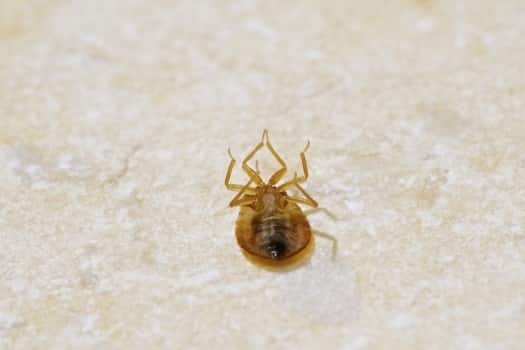
As for whether the scent of blood attracts them, no scientific studies have been done on the topic, but it’s unlikely. There would be no reason for them to be. They want to find a host that they can feed on in the long-term.
If you’re leaving pools of blood everywhere, you won’t be around much longer, and neither will the bed bugs’ source of food. And any bed bug that developed the ability to smell blood and be attracted to it would have hardly any hosts. The short answer, then, is that they probably aren’t.
2) Are Bed Bugs Attracted to Sperm?
It’s unclear where this myth came from, but there is no scientific research on the topic as of yet. It may have started as a rumor, or it may be connected to the idea of bed bugs being attracted to dirty laundry. Either way, it’s impossible to say.
Bed bugs don’t eat anything other than blood, so the idea that sperm contains a nutrient or protein that they might be attracted to can’t be true. It also doesn’t contain carbon dioxide, so that avenue of possibility is ruled out. On the other hand, bed bugs can be attracted to body temperature. But the fact is that if a couple has just had sex, the bed bugs will be attracted to the couple, and not to anything else.
3) Are Bed Bugs Attracted to Food?
No, bed bugs aren’t attracted to food. At least they aren’t if you mean the food that we eat—to them, we are their food, and of course, they’re attracted to us.
Common sense can rule this idea out. If you look at an infested house, you won’t find any bed bugs in the kitchen. They need to live somewhere that they can easily access a host at night.
They don’t like to travel far. The maximum distance is about 5 or 6 feet away. Remember, bed bugs are tiny, and having to walk across your entire apartment or up the stairs of your house would be a very long quest for an insect that small.
It would make sense if bed bugs were like other insects. Cockroaches, for example, are attracted to food. Mice and rats aren’t insects, but they’re other household pests that you might expect to be attracted by crumbs left behind the fridge. But as we’ve said, bed bugs feed on nothing but their host. It doesn’t make a difference to them if there’s any food lying around, too.
Bed bugs also wouldn’t lay their eggs on food. Flies lay eggs on food, of course, but flies eat a range of things especially when they’re larvae. Bed bugs don’t, whether they’re young or old. They much prefer to lay their eggs in dark cracks or crevices close to their host.
4) Are Bed Bugs Attracted to Hair?
Many parasites live in hair. That’s why many people who have a bed bug infestation think they can feel them crawling around their hair. Even worse, some people think they carry them around in their hair during the day! So, are bedbugs attracted to hair?
No, they aren’t. They hate the stuff. They won’t hide in your hair, and they won’t stay there during the day. There are many reasons why. First, they’re not the right shape. Fleas and lice are very small and have very narrow bodies so that they can fit in the gaps between hairs. Otherwise, they wouldn’t be able to move around in there.
If you’ve ever seen a bed bug, you’ll know that they’re just the wrong shape. They’re very flat, but extremely wide, which is just the completely wrong shape for living in hair.
Fleas and lice also have other adaptations that help them stay attached to a host. Fleas, for example, are covered in minuscule hairs that help them stick to their host like Velcro without falling off. And lice have legs that can wrap around a hair so that they can grip onto it as hard as they can. Bed bugs have neither of these adaptations.
If you think you can feel bed bugs crawling around in your hair, the problem might be psychosomatic. That doesn’t mean you’ve gone crazy—it just means that your brain is misinterpreting signals from your body because you’re anxious or afraid of something. The more you think about bed bugs, the itchier you feel.
5) Are Bed Bugs Attracted to Raw Meat?
The idea makes sense in a certain way. Some people leave out a piece of raw meat that they think will attract bed bugs away from them, but there many reasons why it wouldn’t work.
First, it’s room temperature. Bed bugs are looking for bodily warmth. The meat also won’t give off any carbon dioxide, so that’s ruled out. Even besides that, raw meat doesn’t have blood in it. It might be red, but muscle tissue—which is what meat is—doesn’t have big veins and arteries running through it.
Even if they were attracted to it, giving the bed bugs something else to feed them would be a terrible idea. You would be helping them out, giving them an appetizer to go with their main course. If they were to stop biting you, they would still be biting the meat, growing and reproducing. But that’s beside the point. Using raw meat to attract bed bugs doesn’t work.
6) Are Bed Bugs Attracted to Electrical Outlets?
Are bed bugs attracted to electronics or electrical outlets? Strictly speaking, they aren’t, but they can use them to hide away.
There’s nothing about electricity, plastic or electronics that attract bed bugs. They prefer things that are organic and biological, like you and your pets. All of the things that attract them are biological.
The carbon dioxide you emit, your body temperature and even the scent you give off have attracted bed bugs for thousands of years, maybe more, and will keep doing so in the future. Relatively modern innovations like electronics won’t, aside from the small amount of heat they give off.
However, in severe infestations, you’ll see some bed bugs hiding out in electrical outlets, or maybe inside your electronics, e.g., TV or laptop. This is because they like dark, hidden cracks, and crevices where nothing will disturb them.
If their hiding spot can also stay at a consistent temperature and can’t be cleaned out, then it will rank even higher. That being said, an infestation won’t start in your outlets. It will begin in your mattress or box spring, then spread outwards from there.
7) Do Bed Bugs Like Cold Rooms?
So, you might think that if you keep your house a little colder than usual that this might stop bed bugs from being attracted to your home. Unfortunately, they aren’t put off by cooler temperatures. Even so, there’s a grain of truth to the idea that they prefer the warmth over the cold.
Bed bugs thrive in warmer temperatures. They breed faster, they grow faster, and they feed more often when it’s warm. That’s why infestations tend to get worse in the summer and a little easier to deal with in the winter.
But bed bugs will be attracted to your home whether it’s warm or cold. They’re adapted to live in a wide variety of indoor temperatures, which is why they’ve flourished both in the time before AC as well as today.
Aside from that, there’s precious little else that may or may not attract them. There are so many myths surrounding bed bugs. It’s difficult to know what’s true and what’s not. Take a look at the rest of our guides for more useful information on where they come from, and how to get rid of them.

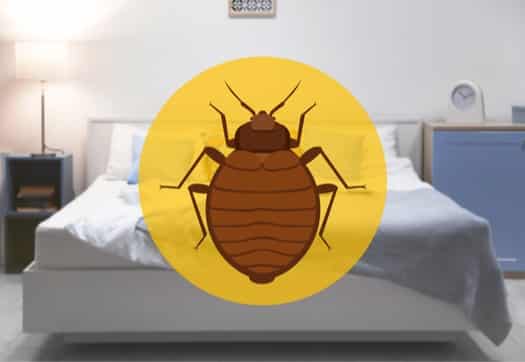
The most thorough yet succinct article I’ve read on bedbugs. And even better the most evidence-based such article.
I’ve done everything I’ve learned here. I’m slow but I’m sure I’ve made progress this week saw 3total they where very flat moving slow. It’s my understanding to keep treating and cleaning for some time. How long?. yes I have put out traps and making the dishes to use under legs of furniture. Thanks for education. It’s first time to have any kind of bugs.
Hi Lou,
We have bed bugs for the first time in 42 years of married life! I cannot believe it, so now our mattress is gone, the wooden pallets underneath, the room is being steamed, inch by inch and your article has helped no end! I now need to check other bedrooms, so much work suddenly, so much searching.
Until now I”d not had a reason to do an in-depth study, thanks a lot for this article, very , very helpful!